Emotional Intelligence: Key to Business and Organizational Success
VerifiedAdded on 2022/10/04
|7
|1878
|22
Essay
AI Summary
This essay delves into the critical role of emotional intelligence (EI) in business and organizational contexts. It defines EI as the capacity to understand, express, and manage emotions effectively, highlighting its various components like self-awareness, self-regulation, motivation, empathy, and social skills. The essay emphasizes the pragmatic benefits of integrating EI, such as fostering effective relationships and enhanced collaboration. It discusses how EI supports recruitment, promotes employee self-management, enhances team cohesiveness, builds positive relationships, and boosts motivation. The essay also examines EI's impact on employee performance, change management, stress reduction, and decision-making. It concludes that emotional intelligence is crucial for creating a conducive environment that values diversity, improves communication, and enhances overall organizational success. The paper cites several research articles to support its claims, providing a well-rounded perspective on the importance of EI in the modern business landscape.
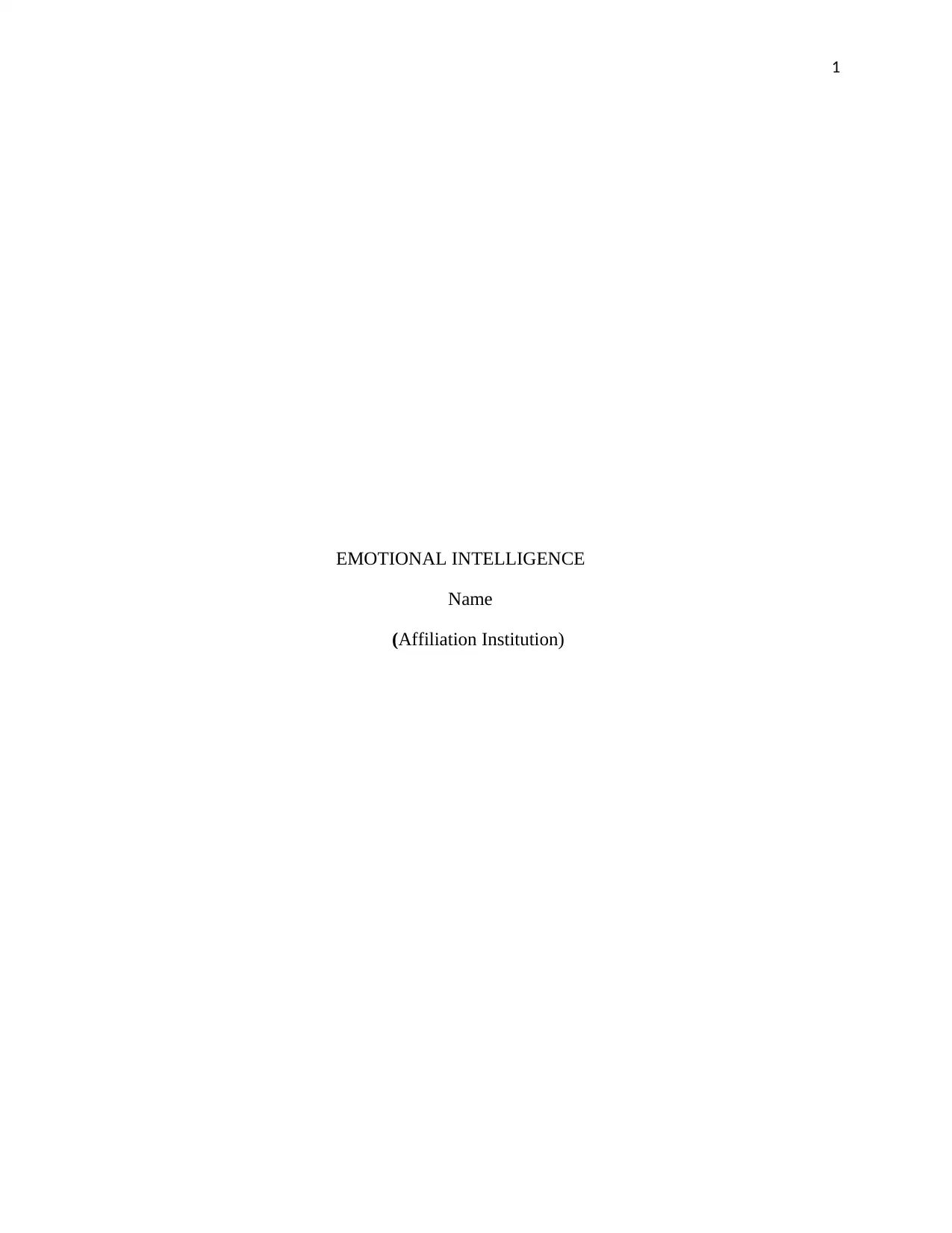
1
EMOTIONAL INTELLIGENCE
Name
(Affiliation Institution)
EMOTIONAL INTELLIGENCE
Name
(Affiliation Institution)
Paraphrase This Document
Need a fresh take? Get an instant paraphrase of this document with our AI Paraphraser
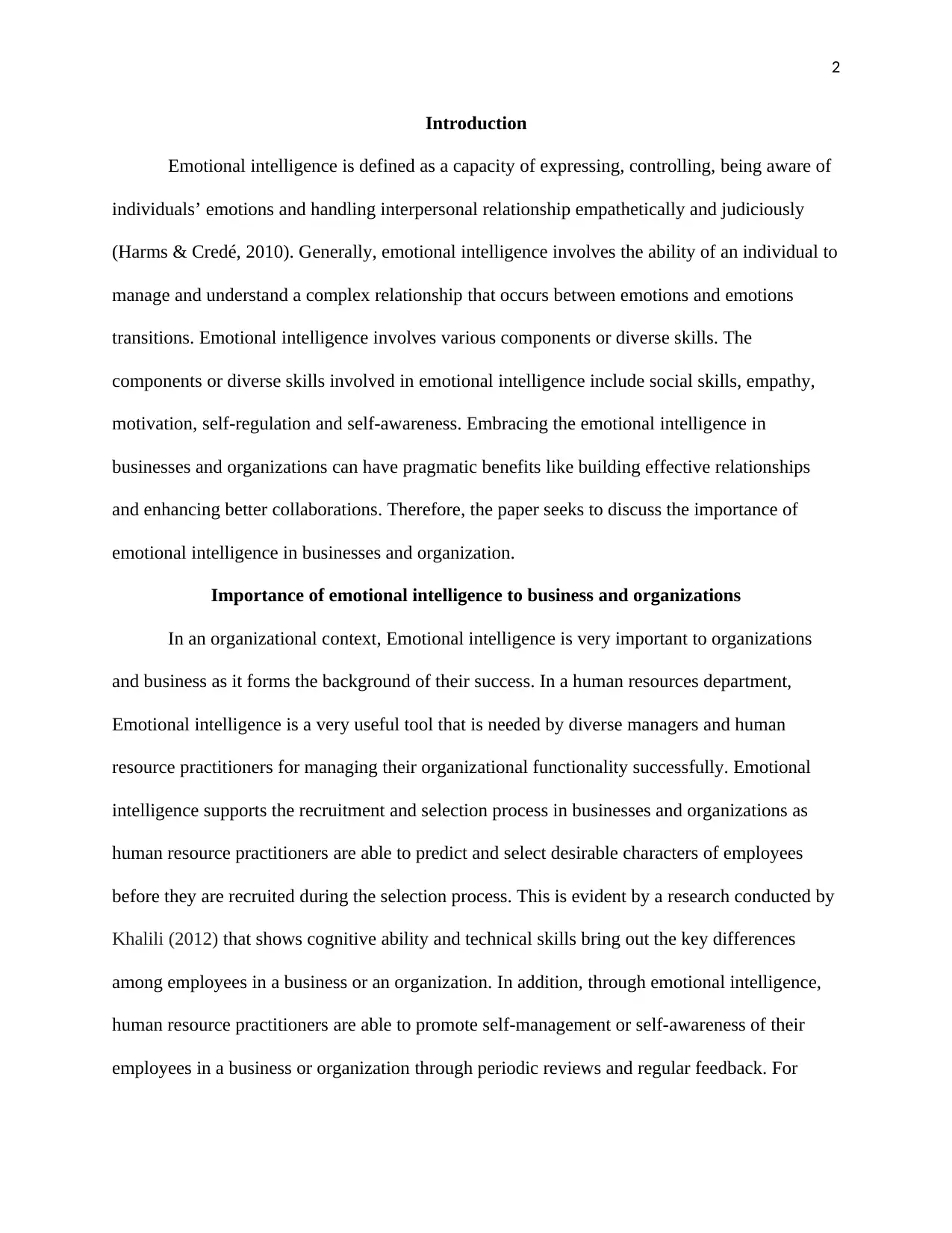
2
Introduction
Emotional intelligence is defined as a capacity of expressing, controlling, being aware of
individuals’ emotions and handling interpersonal relationship empathetically and judiciously
(Harms & Credé, 2010). Generally, emotional intelligence involves the ability of an individual to
manage and understand a complex relationship that occurs between emotions and emotions
transitions. Emotional intelligence involves various components or diverse skills. The
components or diverse skills involved in emotional intelligence include social skills, empathy,
motivation, self-regulation and self-awareness. Embracing the emotional intelligence in
businesses and organizations can have pragmatic benefits like building effective relationships
and enhancing better collaborations. Therefore, the paper seeks to discuss the importance of
emotional intelligence in businesses and organization.
Importance of emotional intelligence to business and organizations
In an organizational context, Emotional intelligence is very important to organizations
and business as it forms the background of their success. In a human resources department,
Emotional intelligence is a very useful tool that is needed by diverse managers and human
resource practitioners for managing their organizational functionality successfully. Emotional
intelligence supports the recruitment and selection process in businesses and organizations as
human resource practitioners are able to predict and select desirable characters of employees
before they are recruited during the selection process. This is evident by a research conducted by
Khalili (2012) that shows cognitive ability and technical skills bring out the key differences
among employees in a business or an organization. In addition, through emotional intelligence,
human resource practitioners are able to promote self-management or self-awareness of their
employees in a business or organization through periodic reviews and regular feedback. For
Introduction
Emotional intelligence is defined as a capacity of expressing, controlling, being aware of
individuals’ emotions and handling interpersonal relationship empathetically and judiciously
(Harms & Credé, 2010). Generally, emotional intelligence involves the ability of an individual to
manage and understand a complex relationship that occurs between emotions and emotions
transitions. Emotional intelligence involves various components or diverse skills. The
components or diverse skills involved in emotional intelligence include social skills, empathy,
motivation, self-regulation and self-awareness. Embracing the emotional intelligence in
businesses and organizations can have pragmatic benefits like building effective relationships
and enhancing better collaborations. Therefore, the paper seeks to discuss the importance of
emotional intelligence in businesses and organization.
Importance of emotional intelligence to business and organizations
In an organizational context, Emotional intelligence is very important to organizations
and business as it forms the background of their success. In a human resources department,
Emotional intelligence is a very useful tool that is needed by diverse managers and human
resource practitioners for managing their organizational functionality successfully. Emotional
intelligence supports the recruitment and selection process in businesses and organizations as
human resource practitioners are able to predict and select desirable characters of employees
before they are recruited during the selection process. This is evident by a research conducted by
Khalili (2012) that shows cognitive ability and technical skills bring out the key differences
among employees in a business or an organization. In addition, through emotional intelligence,
human resource practitioners are able to promote self-management or self-awareness of their
employees in a business or organization through periodic reviews and regular feedback. For
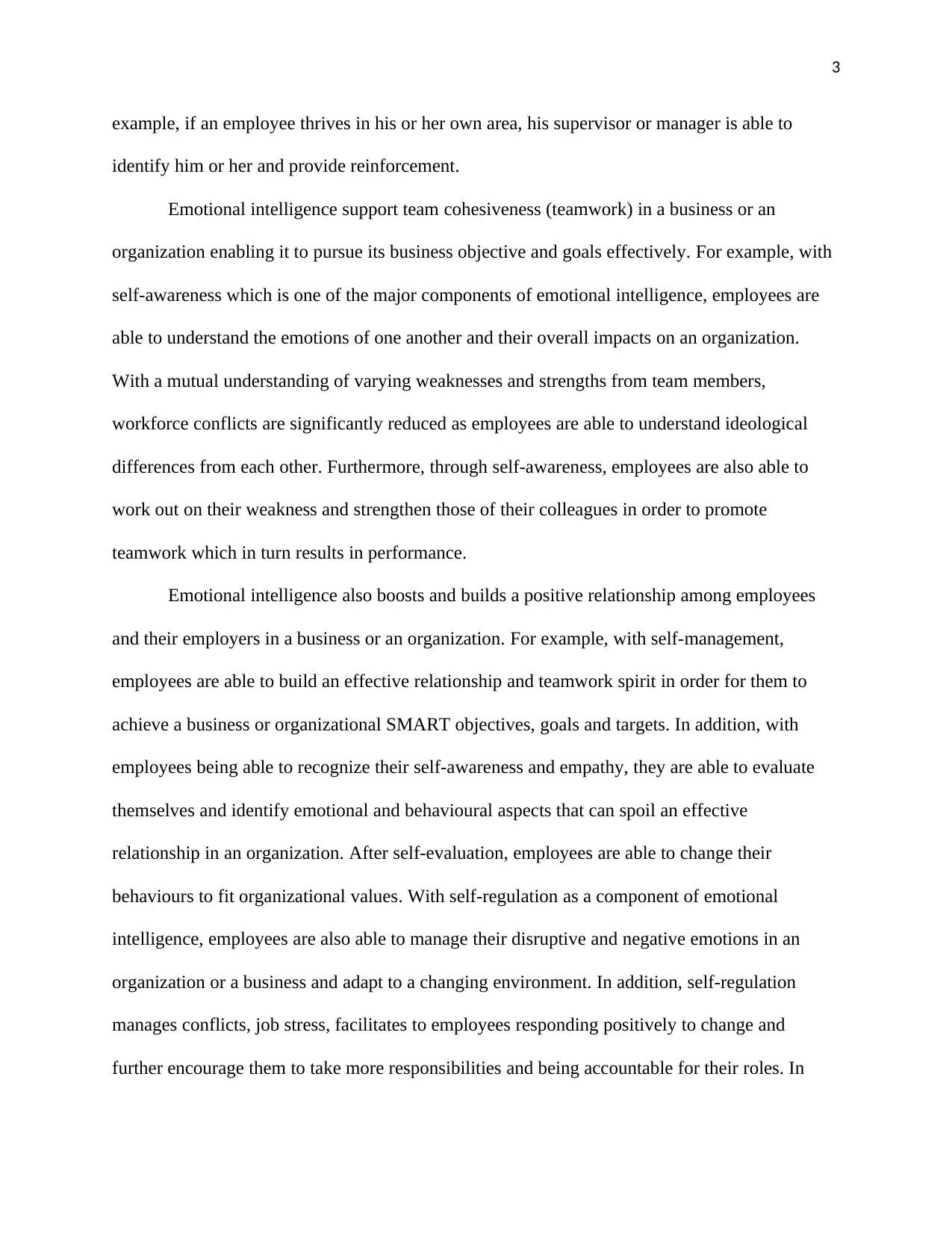
3
example, if an employee thrives in his or her own area, his supervisor or manager is able to
identify him or her and provide reinforcement.
Emotional intelligence support team cohesiveness (teamwork) in a business or an
organization enabling it to pursue its business objective and goals effectively. For example, with
self-awareness which is one of the major components of emotional intelligence, employees are
able to understand the emotions of one another and their overall impacts on an organization.
With a mutual understanding of varying weaknesses and strengths from team members,
workforce conflicts are significantly reduced as employees are able to understand ideological
differences from each other. Furthermore, through self-awareness, employees are also able to
work out on their weakness and strengthen those of their colleagues in order to promote
teamwork which in turn results in performance.
Emotional intelligence also boosts and builds a positive relationship among employees
and their employers in a business or an organization. For example, with self-management,
employees are able to build an effective relationship and teamwork spirit in order for them to
achieve a business or organizational SMART objectives, goals and targets. In addition, with
employees being able to recognize their self-awareness and empathy, they are able to evaluate
themselves and identify emotional and behavioural aspects that can spoil an effective
relationship in an organization. After self-evaluation, employees are able to change their
behaviours to fit organizational values. With self-regulation as a component of emotional
intelligence, employees are also able to manage their disruptive and negative emotions in an
organization or a business and adapt to a changing environment. In addition, self-regulation
manages conflicts, job stress, facilitates to employees responding positively to change and
further encourage them to take more responsibilities and being accountable for their roles. In
example, if an employee thrives in his or her own area, his supervisor or manager is able to
identify him or her and provide reinforcement.
Emotional intelligence support team cohesiveness (teamwork) in a business or an
organization enabling it to pursue its business objective and goals effectively. For example, with
self-awareness which is one of the major components of emotional intelligence, employees are
able to understand the emotions of one another and their overall impacts on an organization.
With a mutual understanding of varying weaknesses and strengths from team members,
workforce conflicts are significantly reduced as employees are able to understand ideological
differences from each other. Furthermore, through self-awareness, employees are also able to
work out on their weakness and strengthen those of their colleagues in order to promote
teamwork which in turn results in performance.
Emotional intelligence also boosts and builds a positive relationship among employees
and their employers in a business or an organization. For example, with self-management,
employees are able to build an effective relationship and teamwork spirit in order for them to
achieve a business or organizational SMART objectives, goals and targets. In addition, with
employees being able to recognize their self-awareness and empathy, they are able to evaluate
themselves and identify emotional and behavioural aspects that can spoil an effective
relationship in an organization. After self-evaluation, employees are able to change their
behaviours to fit organizational values. With self-regulation as a component of emotional
intelligence, employees are also able to manage their disruptive and negative emotions in an
organization or a business and adapt to a changing environment. In addition, self-regulation
manages conflicts, job stress, facilitates to employees responding positively to change and
further encourage them to take more responsibilities and being accountable for their roles. In
⊘ This is a preview!⊘
Do you want full access?
Subscribe today to unlock all pages.

Trusted by 1+ million students worldwide
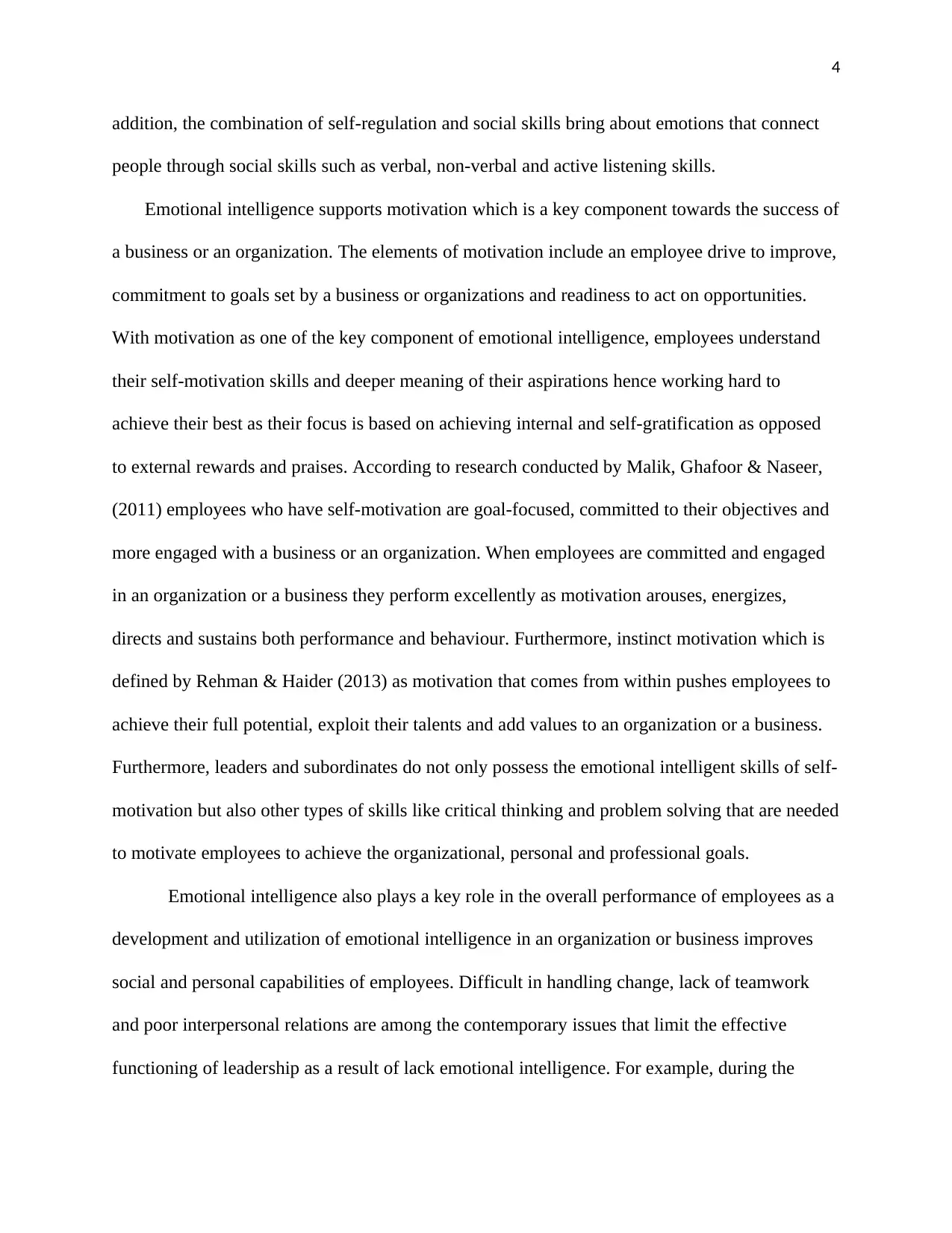
4
addition, the combination of self-regulation and social skills bring about emotions that connect
people through social skills such as verbal, non-verbal and active listening skills.
Emotional intelligence supports motivation which is a key component towards the success of
a business or an organization. The elements of motivation include an employee drive to improve,
commitment to goals set by a business or organizations and readiness to act on opportunities.
With motivation as one of the key component of emotional intelligence, employees understand
their self-motivation skills and deeper meaning of their aspirations hence working hard to
achieve their best as their focus is based on achieving internal and self-gratification as opposed
to external rewards and praises. According to research conducted by Malik, Ghafoor & Naseer,
(2011) employees who have self-motivation are goal-focused, committed to their objectives and
more engaged with a business or an organization. When employees are committed and engaged
in an organization or a business they perform excellently as motivation arouses, energizes,
directs and sustains both performance and behaviour. Furthermore, instinct motivation which is
defined by Rehman & Haider (2013) as motivation that comes from within pushes employees to
achieve their full potential, exploit their talents and add values to an organization or a business.
Furthermore, leaders and subordinates do not only possess the emotional intelligent skills of self-
motivation but also other types of skills like critical thinking and problem solving that are needed
to motivate employees to achieve the organizational, personal and professional goals.
Emotional intelligence also plays a key role in the overall performance of employees as a
development and utilization of emotional intelligence in an organization or business improves
social and personal capabilities of employees. Difficult in handling change, lack of teamwork
and poor interpersonal relations are among the contemporary issues that limit the effective
functioning of leadership as a result of lack emotional intelligence. For example, during the
addition, the combination of self-regulation and social skills bring about emotions that connect
people through social skills such as verbal, non-verbal and active listening skills.
Emotional intelligence supports motivation which is a key component towards the success of
a business or an organization. The elements of motivation include an employee drive to improve,
commitment to goals set by a business or organizations and readiness to act on opportunities.
With motivation as one of the key component of emotional intelligence, employees understand
their self-motivation skills and deeper meaning of their aspirations hence working hard to
achieve their best as their focus is based on achieving internal and self-gratification as opposed
to external rewards and praises. According to research conducted by Malik, Ghafoor & Naseer,
(2011) employees who have self-motivation are goal-focused, committed to their objectives and
more engaged with a business or an organization. When employees are committed and engaged
in an organization or a business they perform excellently as motivation arouses, energizes,
directs and sustains both performance and behaviour. Furthermore, instinct motivation which is
defined by Rehman & Haider (2013) as motivation that comes from within pushes employees to
achieve their full potential, exploit their talents and add values to an organization or a business.
Furthermore, leaders and subordinates do not only possess the emotional intelligent skills of self-
motivation but also other types of skills like critical thinking and problem solving that are needed
to motivate employees to achieve the organizational, personal and professional goals.
Emotional intelligence also plays a key role in the overall performance of employees as a
development and utilization of emotional intelligence in an organization or business improves
social and personal capabilities of employees. Difficult in handling change, lack of teamwork
and poor interpersonal relations are among the contemporary issues that limit the effective
functioning of leadership as a result of lack emotional intelligence. For example, during the
Paraphrase This Document
Need a fresh take? Get an instant paraphrase of this document with our AI Paraphraser
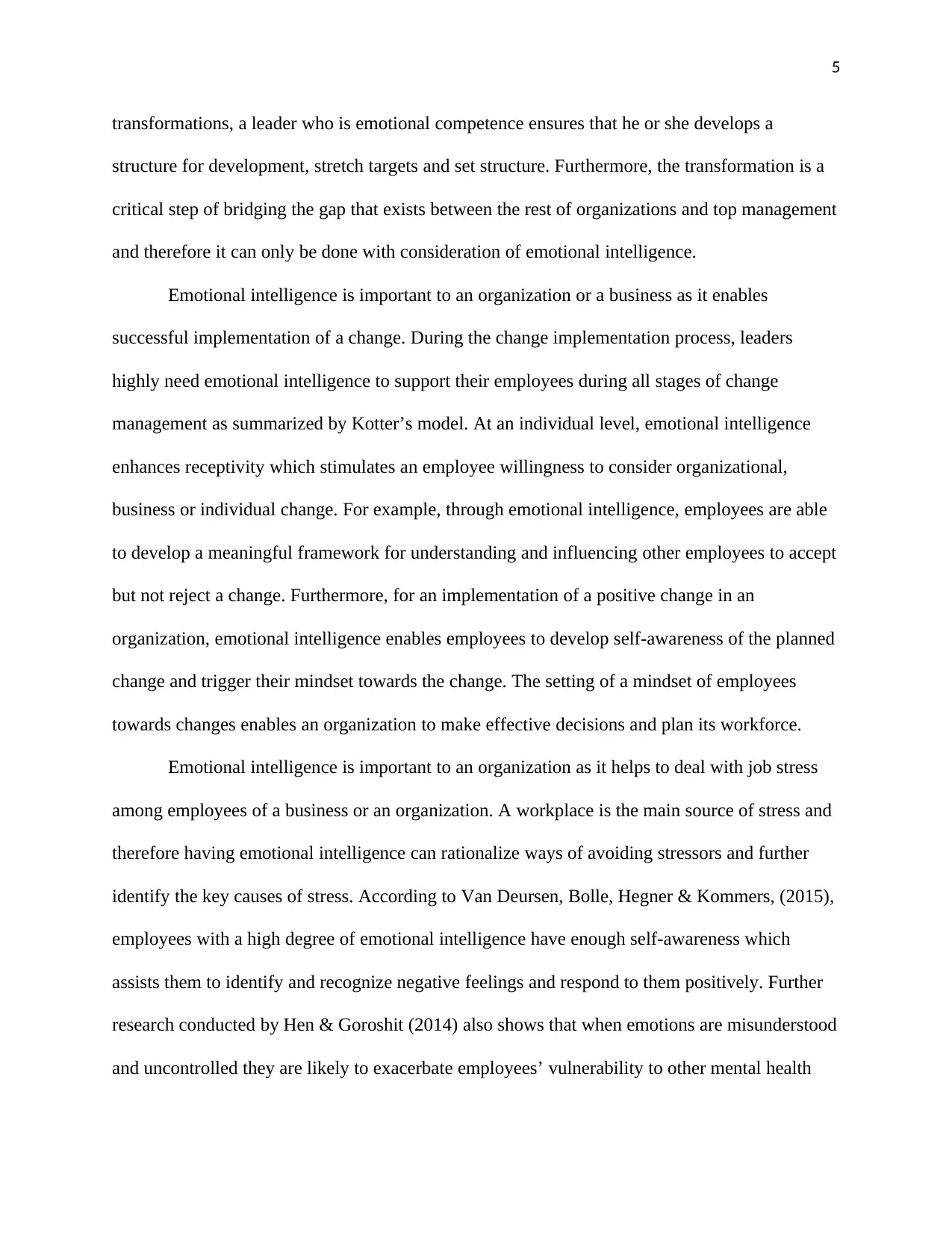
5
transformations, a leader who is emotional competence ensures that he or she develops a
structure for development, stretch targets and set structure. Furthermore, the transformation is a
critical step of bridging the gap that exists between the rest of organizations and top management
and therefore it can only be done with consideration of emotional intelligence.
Emotional intelligence is important to an organization or a business as it enables
successful implementation of a change. During the change implementation process, leaders
highly need emotional intelligence to support their employees during all stages of change
management as summarized by Kotter’s model. At an individual level, emotional intelligence
enhances receptivity which stimulates an employee willingness to consider organizational,
business or individual change. For example, through emotional intelligence, employees are able
to develop a meaningful framework for understanding and influencing other employees to accept
but not reject a change. Furthermore, for an implementation of a positive change in an
organization, emotional intelligence enables employees to develop self-awareness of the planned
change and trigger their mindset towards the change. The setting of a mindset of employees
towards changes enables an organization to make effective decisions and plan its workforce.
Emotional intelligence is important to an organization as it helps to deal with job stress
among employees of a business or an organization. A workplace is the main source of stress and
therefore having emotional intelligence can rationalize ways of avoiding stressors and further
identify the key causes of stress. According to Van Deursen, Bolle, Hegner & Kommers, (2015),
employees with a high degree of emotional intelligence have enough self-awareness which
assists them to identify and recognize negative feelings and respond to them positively. Further
research conducted by Hen & Goroshit (2014) also shows that when emotions are misunderstood
and uncontrolled they are likely to exacerbate employees’ vulnerability to other mental health
transformations, a leader who is emotional competence ensures that he or she develops a
structure for development, stretch targets and set structure. Furthermore, the transformation is a
critical step of bridging the gap that exists between the rest of organizations and top management
and therefore it can only be done with consideration of emotional intelligence.
Emotional intelligence is important to an organization or a business as it enables
successful implementation of a change. During the change implementation process, leaders
highly need emotional intelligence to support their employees during all stages of change
management as summarized by Kotter’s model. At an individual level, emotional intelligence
enhances receptivity which stimulates an employee willingness to consider organizational,
business or individual change. For example, through emotional intelligence, employees are able
to develop a meaningful framework for understanding and influencing other employees to accept
but not reject a change. Furthermore, for an implementation of a positive change in an
organization, emotional intelligence enables employees to develop self-awareness of the planned
change and trigger their mindset towards the change. The setting of a mindset of employees
towards changes enables an organization to make effective decisions and plan its workforce.
Emotional intelligence is important to an organization as it helps to deal with job stress
among employees of a business or an organization. A workplace is the main source of stress and
therefore having emotional intelligence can rationalize ways of avoiding stressors and further
identify the key causes of stress. According to Van Deursen, Bolle, Hegner & Kommers, (2015),
employees with a high degree of emotional intelligence have enough self-awareness which
assists them to identify and recognize negative feelings and respond to them positively. Further
research conducted by Hen & Goroshit (2014) also shows that when emotions are misunderstood
and uncontrolled they are likely to exacerbate employees’ vulnerability to other mental health
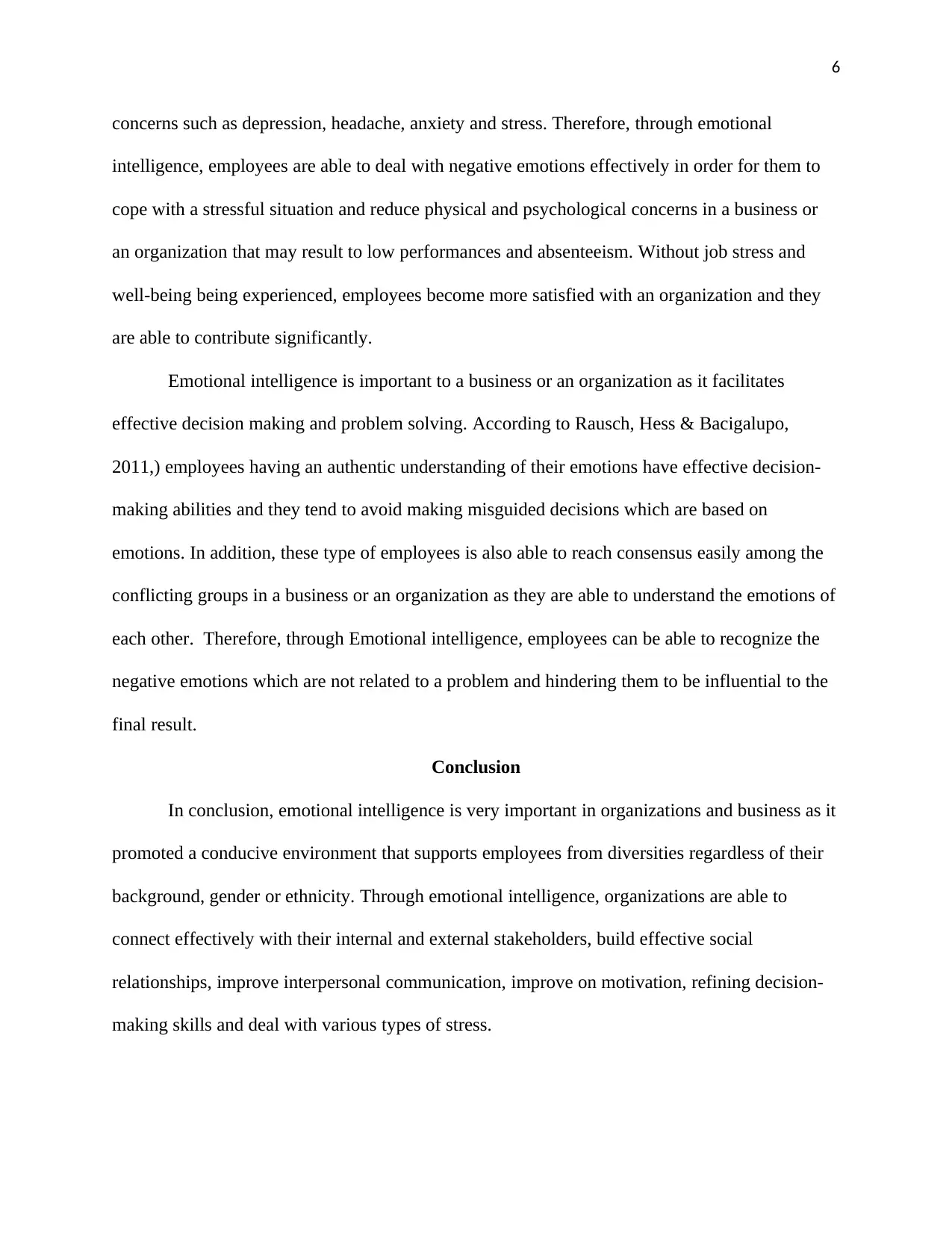
6
concerns such as depression, headache, anxiety and stress. Therefore, through emotional
intelligence, employees are able to deal with negative emotions effectively in order for them to
cope with a stressful situation and reduce physical and psychological concerns in a business or
an organization that may result to low performances and absenteeism. Without job stress and
well-being being experienced, employees become more satisfied with an organization and they
are able to contribute significantly.
Emotional intelligence is important to a business or an organization as it facilitates
effective decision making and problem solving. According to Rausch, Hess & Bacigalupo,
2011,) employees having an authentic understanding of their emotions have effective decision-
making abilities and they tend to avoid making misguided decisions which are based on
emotions. In addition, these type of employees is also able to reach consensus easily among the
conflicting groups in a business or an organization as they are able to understand the emotions of
each other. Therefore, through Emotional intelligence, employees can be able to recognize the
negative emotions which are not related to a problem and hindering them to be influential to the
final result.
Conclusion
In conclusion, emotional intelligence is very important in organizations and business as it
promoted a conducive environment that supports employees from diversities regardless of their
background, gender or ethnicity. Through emotional intelligence, organizations are able to
connect effectively with their internal and external stakeholders, build effective social
relationships, improve interpersonal communication, improve on motivation, refining decision-
making skills and deal with various types of stress.
concerns such as depression, headache, anxiety and stress. Therefore, through emotional
intelligence, employees are able to deal with negative emotions effectively in order for them to
cope with a stressful situation and reduce physical and psychological concerns in a business or
an organization that may result to low performances and absenteeism. Without job stress and
well-being being experienced, employees become more satisfied with an organization and they
are able to contribute significantly.
Emotional intelligence is important to a business or an organization as it facilitates
effective decision making and problem solving. According to Rausch, Hess & Bacigalupo,
2011,) employees having an authentic understanding of their emotions have effective decision-
making abilities and they tend to avoid making misguided decisions which are based on
emotions. In addition, these type of employees is also able to reach consensus easily among the
conflicting groups in a business or an organization as they are able to understand the emotions of
each other. Therefore, through Emotional intelligence, employees can be able to recognize the
negative emotions which are not related to a problem and hindering them to be influential to the
final result.
Conclusion
In conclusion, emotional intelligence is very important in organizations and business as it
promoted a conducive environment that supports employees from diversities regardless of their
background, gender or ethnicity. Through emotional intelligence, organizations are able to
connect effectively with their internal and external stakeholders, build effective social
relationships, improve interpersonal communication, improve on motivation, refining decision-
making skills and deal with various types of stress.
⊘ This is a preview!⊘
Do you want full access?
Subscribe today to unlock all pages.

Trusted by 1+ million students worldwide
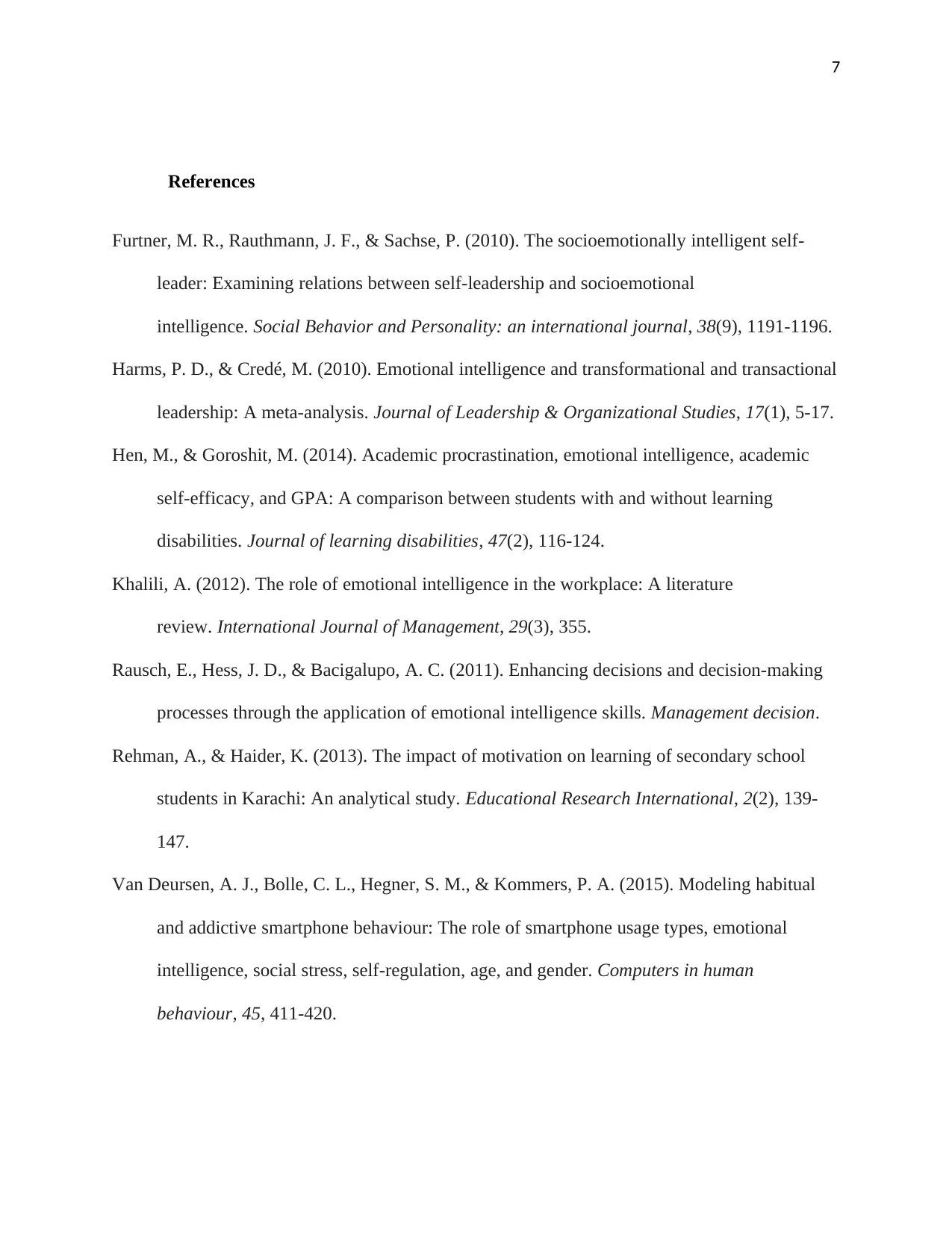
7
References
Furtner, M. R., Rauthmann, J. F., & Sachse, P. (2010). The socioemotionally intelligent self-
leader: Examining relations between self-leadership and socioemotional
intelligence. Social Behavior and Personality: an international journal, 38(9), 1191-1196.
Harms, P. D., & Credé, M. (2010). Emotional intelligence and transformational and transactional
leadership: A meta-analysis. Journal of Leadership & Organizational Studies, 17(1), 5-17.
Hen, M., & Goroshit, M. (2014). Academic procrastination, emotional intelligence, academic
self-efficacy, and GPA: A comparison between students with and without learning
disabilities. Journal of learning disabilities, 47(2), 116-124.
Khalili, A. (2012). The role of emotional intelligence in the workplace: A literature
review. International Journal of Management, 29(3), 355.
Rausch, E., Hess, J. D., & Bacigalupo, A. C. (2011). Enhancing decisions and decision‐making
processes through the application of emotional intelligence skills. Management decision.
Rehman, A., & Haider, K. (2013). The impact of motivation on learning of secondary school
students in Karachi: An analytical study. Educational Research International, 2(2), 139-
147.
Van Deursen, A. J., Bolle, C. L., Hegner, S. M., & Kommers, P. A. (2015). Modeling habitual
and addictive smartphone behaviour: The role of smartphone usage types, emotional
intelligence, social stress, self-regulation, age, and gender. Computers in human
behaviour, 45, 411-420.
References
Furtner, M. R., Rauthmann, J. F., & Sachse, P. (2010). The socioemotionally intelligent self-
leader: Examining relations between self-leadership and socioemotional
intelligence. Social Behavior and Personality: an international journal, 38(9), 1191-1196.
Harms, P. D., & Credé, M. (2010). Emotional intelligence and transformational and transactional
leadership: A meta-analysis. Journal of Leadership & Organizational Studies, 17(1), 5-17.
Hen, M., & Goroshit, M. (2014). Academic procrastination, emotional intelligence, academic
self-efficacy, and GPA: A comparison between students with and without learning
disabilities. Journal of learning disabilities, 47(2), 116-124.
Khalili, A. (2012). The role of emotional intelligence in the workplace: A literature
review. International Journal of Management, 29(3), 355.
Rausch, E., Hess, J. D., & Bacigalupo, A. C. (2011). Enhancing decisions and decision‐making
processes through the application of emotional intelligence skills. Management decision.
Rehman, A., & Haider, K. (2013). The impact of motivation on learning of secondary school
students in Karachi: An analytical study. Educational Research International, 2(2), 139-
147.
Van Deursen, A. J., Bolle, C. L., Hegner, S. M., & Kommers, P. A. (2015). Modeling habitual
and addictive smartphone behaviour: The role of smartphone usage types, emotional
intelligence, social stress, self-regulation, age, and gender. Computers in human
behaviour, 45, 411-420.
1 out of 7
Related Documents
Your All-in-One AI-Powered Toolkit for Academic Success.
+13062052269
info@desklib.com
Available 24*7 on WhatsApp / Email
![[object Object]](/_next/static/media/star-bottom.7253800d.svg)
Unlock your academic potential
Copyright © 2020–2026 A2Z Services. All Rights Reserved. Developed and managed by ZUCOL.




